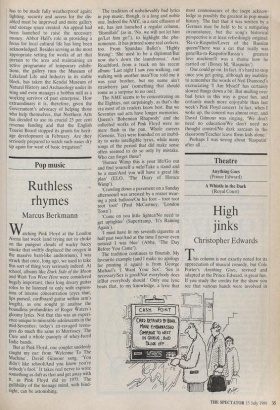Pop music
Ruthless rhymes
Marcus Berkmann
atching Pink Floyd at the London Arena last week (and trying not to choke on the pungent clouds of wacky baccy smoke that swiftly displaced the oxygen in the massive barn-like auditorium), I was struck that once, long ago, we used to take this sort of thing very seriously indeed. At school, albums like Dark Side of the Moon and Wish You Were Here were considered hugely important, their long dreary guitar solos to be listened to only with express- ions of intense concentration (eyes shut, lips pursed, cardboard guitar within arm's length), as one sought to analyse the boundless profundities of Roger Waters's gloomy lyrics. Not that this was an experi- ence unique to miserable adolescents in the mid-Seventies: today's zit-ravaged teena- gers do much the same to Morrissey, The Cure and a whole panoply of whey-faced Indie bands.
But at Pink Floyd, one couplet suddenly caught my ear: from 'Welcome To The Machine', David Gilmour sang, 'You didn't like school/And you know you're nobody's fool.' It takes real nerve to write something as daft as that and get away with it, as Pink Floyd did in 1975. The gullibility of the teenage mind, with hind- sight, can be astonishing.
The tradition of unbelievably bad lyrics in pop music, though, is a long and noble one. Indeed the NME, in a rare effusion of wit, has just launched a regular column, `Bismillah!' (as in, 'No, we will not let him
go/Let him go!'), to highlight the phe- nomenon. It has printed some real corkers, too. From Spandau Ballet's 'Highly Strung': 'She used to be a diplomat/But now she's down the laundromat.' And Roachford, from a track on his recent album: 'Last night I saw you walking, out walking with another man/You told me it was your brother, but my name ain't strawberry jam' (something that should come as a surprise to no one).
The NME seems to be concentrating on
the Fighties, not surprisingly, as that's the era most of its readers know best. But we Seventies sad acts have longer memories. Queen's 'Bohemian Rhapsody' and the collected works of Pink Floyd were no mere flash in the pan. Whole careers (Genesis, Yes) were founded on an inabil- ity to write intelligible lyrics, while many songs of the period that did make sense often seemed to do so only by mistake.
Who can forget these? `Horace Wimp this is your life/Go out and find yourself a wife/Take a stand and be a man/And you will have a great life plan' (ELO, 'The Diary of Horace Wimp'). `Crawling down a pavement on a Sunday afternoon/I was arrested by a rozzer wear- ing a pink balloon/On his foot — toot toot toot toot' (Paul McCartney, 'London Town'). `Come on you little fighter/No need to get uptighter' (Supertramp, 'It's Raining Again'). 'I must have lit my seventh cigarette at half past two/And at the time I never even noticed I was blue' (Abba, 'The Day Before You Came').
The tradition continues to flourish. My favourite example (and I make no apology for printing it again) is from George - Michael's 'I Want Your Sex': 'Sex is necessary/Sex is good/Not everybody does it/But everybody should.' Only one lyric beats that, to my knowledge, a lyric that
most connoisseurs of the inept acknow- ledge as possibly the greatest in pop music history. The fact that it was written by a German may be held to be a mitigating circumstance, but the song's historical perspective is at least refreshingly original: `Ra-ra-Rasputin/Lover of the Russian queen/There was a cat that really was
gone/Ra-ra-Rasputin/Russia's greatest love machine/It was a shame how he carried on' (Boney M, `Rasputin'). One could go on. In fact, it's hard to stop once you get going, although my inability to remember the words of Neil Diamond's excruciating 'I Am Myself' has certainly slowed things down a bit. But mulling over bad lyrics in this way is great fun, and certainly much more enjoyable than last week's Pink Floyd concert. In fact, when I woke up, the concert was almost over, and David Gilmour was singing, 'We don't need no education/We don't need no thought control/No dark sarcasm in the classroom/Teacher leave them kids alone.'
Perhaps I was wrong about `Rasputin' after


















































 Previous page
Previous page